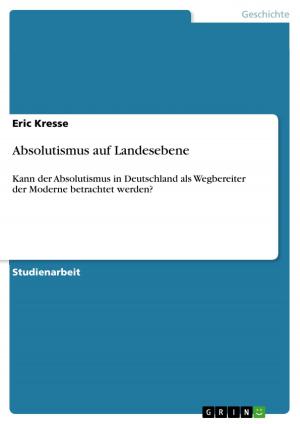The Individual in Werner Herzog's Films Aguirre, the Wrath of God and STROSZEK
Nonfiction, Entertainment, Performing Arts, Film| Author: | Guido Böhm | ISBN: | 9783638575263 |
| Publisher: | GRIN Verlag | Publication: | November 29, 2006 |
| Imprint: | GRIN Verlag | Language: | English |
| Author: | Guido Böhm |
| ISBN: | 9783638575263 |
| Publisher: | GRIN Verlag |
| Publication: | November 29, 2006 |
| Imprint: | GRIN Verlag |
| Language: | English |
Seminar paper from the year 2001 in the subject Film Science, grade: A (1,3), University of Glasgow (Department of Film- and TV-Studies), 11 entries in the bibliography, language: English, abstract: 'The epithets used to describe the films of Werner Herzog invariably emphasise the critics' feeling that they have been impressed by something that goes beyond rational analysis'1 This statement by John Sandford seems to sum up the fascinating consequence of the mysterious enigma of Werner Herzog's films: an irrational aesthetic method, an irrational performance and an irrational effect. Typical terms used in the past to describe Herzog's work were: 'obsessive, fanatic, titanic, apocalyptic, holy, demonic', but also, more neutrally, terms like 'fantastic, irrational, mysterious'.2 Indeed, when watching his films, they can create a very strange atmosphere. The viewer is often confronted with human megalomania or total human failure which stands in contrast to a mighty, unconquerable nature. Herzog plays with the presentation of these concepts. They are linked, varied, mixed and often set in a somewhat mystical context. At times this mixture of opposing elements are that grotesque that the viewer does not really know whether to laugh or to cry. There is a steady presence of an uncomfortable kind of humour in Herzog's work. Some of Herzog's films seem more like a psychedelic experience, than a typical, classically told story, which follows narrative laws like exposition, plot or climax. In these films the emotions seem to be more important than their narrative origin and therefore the story becomes less important than what it carries. This is the Herzog-typical irrational element, which leaves the viewer impressed, but leaves him/her with more questions than answers. 1 Sandford, John: The New German Cinema. (London: 1980); p. 48 2 ibid.; p. 48
Seminar paper from the year 2001 in the subject Film Science, grade: A (1,3), University of Glasgow (Department of Film- and TV-Studies), 11 entries in the bibliography, language: English, abstract: 'The epithets used to describe the films of Werner Herzog invariably emphasise the critics' feeling that they have been impressed by something that goes beyond rational analysis'1 This statement by John Sandford seems to sum up the fascinating consequence of the mysterious enigma of Werner Herzog's films: an irrational aesthetic method, an irrational performance and an irrational effect. Typical terms used in the past to describe Herzog's work were: 'obsessive, fanatic, titanic, apocalyptic, holy, demonic', but also, more neutrally, terms like 'fantastic, irrational, mysterious'.2 Indeed, when watching his films, they can create a very strange atmosphere. The viewer is often confronted with human megalomania or total human failure which stands in contrast to a mighty, unconquerable nature. Herzog plays with the presentation of these concepts. They are linked, varied, mixed and often set in a somewhat mystical context. At times this mixture of opposing elements are that grotesque that the viewer does not really know whether to laugh or to cry. There is a steady presence of an uncomfortable kind of humour in Herzog's work. Some of Herzog's films seem more like a psychedelic experience, than a typical, classically told story, which follows narrative laws like exposition, plot or climax. In these films the emotions seem to be more important than their narrative origin and therefore the story becomes less important than what it carries. This is the Herzog-typical irrational element, which leaves the viewer impressed, but leaves him/her with more questions than answers. 1 Sandford, John: The New German Cinema. (London: 1980); p. 48 2 ibid.; p. 48















